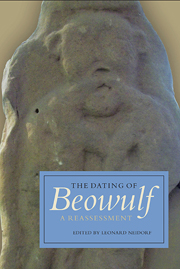Book contents
- Frontmatter
- Contents
- List of Tables
- List of Illustrations
- List of Contributors
- Acknowledgements
- Introduction
- 1 Beowulf and Language History
- 2 Germanic Legend, Scribal Errors, and Cultural Change
- 3 Names in Beowulf and Anglo-Saxon England
- 4 The Limits of Conservative Composition in Old English Poetry
- 5 The Date of Composition of Beowulf and the Evidence of Metrical Evolution
- 6 Beowulf and the Containment of Scyld in the West Saxon Royal Genealogy
- 7 History and Fiction in the Frisian Raid
- 8 ‘Give the People What They Want’: Historiography and Rhetorical History of the Dating of Beowulf Controversy
- 9 A Note on the Other Heorot
- 10 Beowulf and Conversion History
- 11 Material Monsters and Semantic Shifts
- 12 Scandals in Toronto: Kaluza's Law and Transliteration Errors
- 13 Afterword: Beowulf and Everything Else
- Index
2 - Germanic Legend, Scribal Errors, and Cultural Change
Published online by Cambridge University Press: 05 October 2014
- Frontmatter
- Contents
- List of Tables
- List of Illustrations
- List of Contributors
- Acknowledgements
- Introduction
- 1 Beowulf and Language History
- 2 Germanic Legend, Scribal Errors, and Cultural Change
- 3 Names in Beowulf and Anglo-Saxon England
- 4 The Limits of Conservative Composition in Old English Poetry
- 5 The Date of Composition of Beowulf and the Evidence of Metrical Evolution
- 6 Beowulf and the Containment of Scyld in the West Saxon Royal Genealogy
- 7 History and Fiction in the Frisian Raid
- 8 ‘Give the People What They Want’: Historiography and Rhetorical History of the Dating of Beowulf Controversy
- 9 A Note on the Other Heorot
- 10 Beowulf and Conversion History
- 11 Material Monsters and Semantic Shifts
- 12 Scandals in Toronto: Kaluza's Law and Transliteration Errors
- 13 Afterword: Beowulf and Everything Else
- Index
Summary
The role of the Beowulf manuscript in scholarship dating the poem's composition has changed considerably in recent years. During the nineteenth and much of the twentieth century, discussions of the poem's date rarely embraced the manuscript as a source of relevant evidence. The omission is not unreasonable, since the presence of transcription errors throughout the manuscript reveals that it is a copy of a copy, written out perhaps at a vast remove from the authorial original. The text transmitted in a copy might contain indications that it had been committed to parchment at a much earlier date, but there is no guarantee that such indications will be present. Accordingly, the previous disregard for the manuscript in dating studies was not an inexplicable oversight, though it suddenly seemed to be such in 1981, when Kevin S. Kiernan argued that his examination of the manuscript revealed it to contain an authorial draft of an eleventh-century poem. Kiernan's hypothesis is rarely credited, and a series of subsequent studies have demonstrated that it is untenable, but the notoriety of his argument has created the impression that manuscript studies might support a later dating. This impression is registered in Nicholas Howe's belief that “from the type of evidence offered, one can predict a scholar's dating of Beowulf … the more closely one works with the language and metre, the more likely one is to date the poem early … the more closely one works with the manuscript, the more likely one is to date the poem late.”
- Type
- Chapter
- Information
- The Dating of BeowulfA Reassessment, pp. 37 - 57Publisher: Boydell & BrewerPrint publication year: 2014



